People
About Andrew Cusack
 Writer, web designer, etc.; born in New York; educated in Argentina, Scotland, and South Africa; now based in London.
Writer, web designer, etc.; born in New York; educated in Argentina, Scotland, and South Africa; now based in London. read more
News
Blogs
Reviews & Periodicals
Arts & Design
World
France
Mitteleuropa
Knickerbockers
Argentina
The Levant
Africa
Cape of Good Hope
Netherlands
Scandinavia
Québec
India
Muscovy
Germany
Academica
Taki Jr Ties the Knot
I’ve always liked Taki’s columns in the Spectator; for his sins, the man has a good heart and often writes with brutal honesty. Anyhow, Mr. Theodoracopulos’s son recently got hitched, with the priest shipped in from Staten Island, and the baptism of the couple’s six-month-old child (!) on the same day. You can read it all yourself. (The links are Taki’s).
Midsummer marriage
Frankly, this was not a cool wedding. There were no security guards, no stretch limos, no Liz Hurleys, no cutting-edge genetic technology, not even a same-sex marriage. Not very with it, I know, but there we are. John Taki and Assia got hitched last Saturday in the most magical setting I have ever seen a Xanadu. ‘And there were gardens bright with sinuous rills/Where blossomed many an incense-bearing tree;/And here were forests ancient as the hills,/Enfolding sunny spots of greenery.’
Old Sam Coleridge must have visited Prince Nettuno Borghese’s property by the sea, west of Rome, because what Kubla Khan decreed is where my boy got hitched. Assia’s father Count Maurizio Baudi di Selve and her mother Maria Grazia never let on what they had in store for us. Maurizio is the scion of the Borghese clan, the oldest princely family of Italy, and he began the celebrations on Friday evening in the Palazzo Borghese, with a small dinner for around 250.
Back in the good old days, Rome was led by princes who built palaces reflecting their power. The present head of the family still lives in an apartment there, sharing the rest of the palazzo with the Circolo della Caccia, Rome’s most exclusive gentlemen’s club. Liveried staff move silently, evoking a time when nobility led from the front. The place is so grand and so beautiful even I managed to behave. The trick for a successful wedding is to keep it small. Only good friends need be invited. The mother of my children, John Taki and I invited 90, Assia’s family 135. Not a freak among them, no stuffed shirts, no charlatans, just young people full of grace and manners to match their beauty.
Afterwards, on the terrace of the Hassler, we began to blow off steam. I had friends who had flown in from New York, Los Angeles, Athens and three all the way from deepest Mexico. The jet lag helped. At five in the morning, the management declared the bar closed because a few bores upstairs found it hard to sleep.
Next day was the big one, so I went to the Borghese Gardens and tried to sweat off some of the booze. After a while I had to sit down next to some fat American tourists who, I think, were complaining about the lack of air-conditioning.
Around five in the afternoon I was driven towards Anzio, where Nettuno lies high above the sea. A long alley lined with hay bales suddenly revealed a beautiful small chapel next to a handsome red house which I mistook for the main one. (It turned out to be the gardener’s cottage; some cottage.) Two large semi-circles of armchairs were provided for the guests outside the chapel. The ceremony was conducted by Father Ramsay, a close friend of my family who had flown in from Staten Island, Noo Yawk.
Though I say it myself, never have I seen a better-looking couple. The father of the bride is a tall and very handsome man, some 20 years younger than me, and when he came in with Assia, the Med glistening in the distance behind, the green walls of the surrounding woods, spots of light penetrating, the scene was so moving I almost blubbed. Close but no cigar. John Taki, an incredibly sloppy dresser, was for the first time in his life looking like Beau Brummell. He had spent three months preparing his sartorial triumph. Two violinists played Vivaldi and, after a ceremony conducted in English and Italian by the polyglot Father Ramsay, it was time for…yes, the baptism of Taki-Tancredi, aged six months. (Leave it to a son of mine to get married in front of his baby son.) My daughter Lolly was his godmother.
The party that followed I will not soon forget. We walked from the chapel to a wood under a canopy of pines where a jazz band played in the pink light of dusk. My friend John Sutin mistook the round tables lined with drink and pizza-makers for the real thing, and had 24 slices of freshly made pizza. As it got dark and we were asked to proceed to an open lawn under an 11th-century tower for dinner, Sutin looked like the proverbial cat that had swallowed you-know-what. Dinner under the stars, topiary transforming the house into a stage set, so many beautiful young girls, it was a bit too much for me. I got completely blotto, gave a good speech, and danced all night to Zulu music, something I don’t do that often. The newly-weds left as the sun was rising, on Bushido, anchored off in the distance and gave a long whistle goodbye. I thought I saw some dolphins escorting them away, but obviously my eyes were playing tricks. A long summer day and night had ended but the memories will always linger like echoes of the mind.
A Royal Gathering
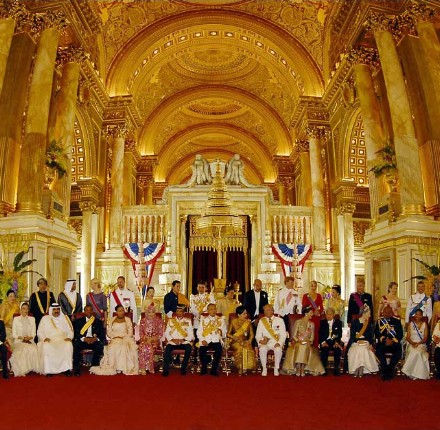
Click here for a photo of most of the world’s reigning monarchs and a number of other royalty, gathered to celebrate the jubilee of the King of Thailand’s accession to the throne.
A few weeks ago, Fr. Rutler informed me that the Queen of Thailand, upon acceding to the throne, made a vow never to perspire. No word on whether she’s kept her vow.
Dr. Strangelove & Dr. Timmerman
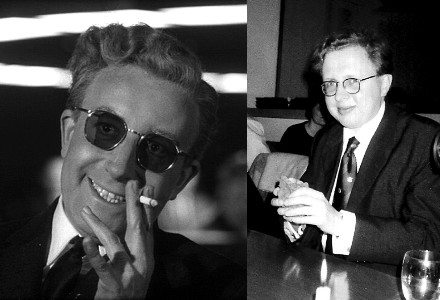
I’ve always had suspicions about my friend Dr. Jens Timmerman, a Göttingen/Balliol man and the Frankfurter Allgemeine Zeitung‘s only subscriber in the Royal Burgh of St Andrews. He clearly has some Strangelovian blood in his veins.
One of the best things about Jens (apart from being a man of erudition and taste) is his refusal to give in to the low standard of propriety maintained by students; especially the practice of arriving for his lecture, picking up the handout, and leaving immediately. One day he made a fake handout and waited for the lazybones to leave before distributing the real handout to the remnant. It included, under ‘Further Reading’, a guide to manners and etiquette. Also, I am informed that whenever a mobile phone goes off during one of his lectures he pronounces “Please turn off your walkie-talkies!”
Dawn Eden in the Irish Times

This morning I was browsing the front pages of a few of the world’s leading dailies and came across the Irish Times. I thought to myself “My, that lady bears a striking resemblence to Dawn Eden.” Then I read the headline ‘Chastity Can Make You Happier, Says Author’ and thought to myself “How bizarre! That sounds just like something Dawn would say.” Finally I put two and two together and thought “Crikey! That is Dawn!” C.f. the Dawn Patrol.
Our readers will no doubt recall that Dawn mentioned my comments regarding the Brooklyn Museum’s mauling of their own façade in her Daily News column. More recently she’s written a book and has been buying refrigerators for nuns.
Elsewhere: Superpower: The View from New York – Matt Alderman reports on a night on the town with Dawn Eden including the ever-prescient and incisive wisdom of Andrew Cusack
Major General Lord Monckton of Brenchley, 1915-2006
Knight Grand Cross of Obedience of the Order of Malta
Maj-Gen the 2nd Viscount Monckton of Brenchley, who has died aged 90, was awarded an MC in 1940 and later became director of Army public relations at a time when the Armed Forces’ public profile was growing in importance.
At 50 he retired early to run his 350-acre farm in Kent and to join the boards of a series of firms to help pay for the education of his five children. In the House of Lords he became a persistent critic of the neglect of rural and military interests, and took a lifelong interest in archaeology and water divining.
The sole Roman Catholic trustee of a £3 million appeal for Canterbury Cathedral in 1974, Monckton was president of the British Association of the Sovereign Order of Malta, and helped to ease strained relations with its Anglican counterpart, the Venerable Order of St John of Jerusalem, by taking part in ecumenical services.
He also played a key role in forming the Order of Malta Volunteers, who aid the sick at the shrine of Lourdes, and in setting up trust care homes with the Venerable Order.
Awaiting Pars Secunda
Since my university years have now come to their scheduled conclusion, there has naturally been much speculation in the learned societies and respectable journals as to what shall become of me. One of our Novanglian fellow-travellers has suggested I follow young Winston Churchill’s aim of legislative service, though I’d rather be a subaltern in the 4th Hussars! Colonel Cusack, meanwhile, has suggested the Executive Mansion rather than the House of Assembly. Alas, the future of young Cusack remains as yet shrouded by a misted veil of uncertainty through which not even old Tiresias can portend. My own particular desire is to be rolled around Bronxville in a wheelchair, flannel blanket covering my lap, with a cane to shake in fury at passing vagrants.
Previously: Whither Cusack?
Tom Grant, 1986-2006
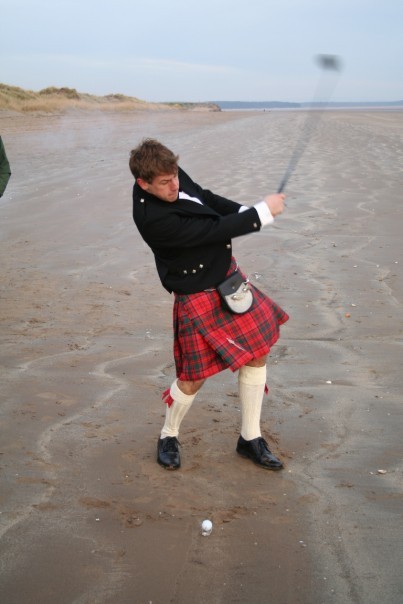
A good man and a brave man. May he rest in peace.
Brave student had heart set on Sandhurst (The Telegraph)
Cadet killed on train was role model for friends (The Times)
Stab victim, 19, died doing the right thing (The Daily Mail)
Tributes to train stabbing victim (BBC News)
The student who was stabbed for trying to break up a fight (The Independent)
Tributes to Hero Stabbed to Death on Train (The Daily Record)
Tributes for ‘joker’ Tom (The Sun)
Whither Cusack?
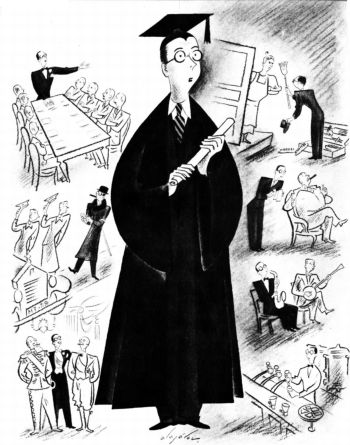
Today in Younger Hall I completed my very last university examination ever. Now all I need to do is graduate in the very same hall in June, and, of course, find some source of income. Thankfully, everyone’s been very helpful, realistic, and practical with career advice: they all see me as editor of the New Yorker. “Furry ’nuff,” I thought to myself, and dabbled into the realm of research by ‘logging on’ to that weekly’s internet presence wherein I discovered that the New Yorker not only already has an editor but it seems he has no intentions of relinquishing the position in the near future. Outrageous!
Well folks, what’s a lad to do?
Torchlit Procession
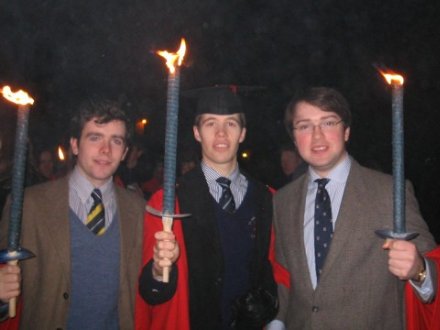
Yours truly, Mr. J. Dunn, and Mr. H. Evans, taking part in the traditional torchlit procession which is part of the rectorial festivities.
Roma – Caput Mundi

Well I’ve finally got around to putting up my report of our pilgrimage to Rome in March, with a plethora of accompanying photographs. It was an amazing time; Easter excepted, it was the jewel in the crown of our penetential season. Read about it all here.
The Knights of Malta Ball 2006

BACK DOWN TO the Assembly Rooms of Edinburgh for the annual ritual of the Knights of Malta Ball and I am happy to report that, as per usual, a good time was had by all. We had a larger contingent heading down from the Auld Grey Toon than last year (when it was just Fräulein Hesser and myself), consisting of Abigail, Jon Burke, Stefano, Clare Dempsey, and yours truly. After gliding down from Fife via taxicab, we met up with Zygmunt Sikorski-Mazur, Jamie Bogle (sans Joanna, alas), and Gerald Warner at the Opal Lounge, a little past half six, and managed to pack in at least a round of drinks before heading across George Street to the Assembly Rooms (depicted in the engraving below).

Having dropped off our coats and such, we swept up the staircase to the Ballroom for some champagne before dinner. After mulling about and conversing for a while we bumped into the Cardinal Archbishop of St Andrews himself, H.E. Keith Patrick O’Brien, himself a Grand Cross Conventual Chaplain to the Order of Malta. We apologised for not maintaining his senior cathedral in St Andrews in the same state as his junior one in Edinburgh, but I did thank him profusely for allowing us an indult mass at Ravelston. (more…)
Henry Lorimer & William F. Buckley
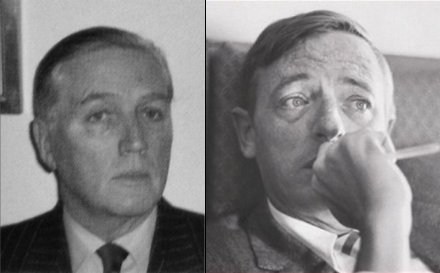
The latest lookalikes: Henry Lorimer, Convenor of the Companions of the Order of Malta in Scotland, and William F. Buckley, Jr., of some reknown.
Improvements
REACTIONARIES HAVE FOOLED themselves into believing the world has been getting worse and worse, essentially since the Fall. Progressives meanwhile, heartened by fairly recent progress-heralding genocidal masterpieces such as the French, Russian, and Chinese revolutions, believe the world is getting better and better with the March of Time. But we, the happy middle, – conservatives and traditionalists – know that Man is as Man was and as Man will be, and that we will see days of sadness and terror just as we will see days of greatness and glory. It was found to be greatly encouraging, therefore, when I chanced upon the Mess of the Officer Training Corps here in St Andrews last night and was greeted not by the bilious throbbing beats of noxious rap music, but instead by the dulcet syncopations of Tchaikovsky’s Swan Lake. Under the attentive ear of J.E.B., new President of the Mess Committee, A Squadron, TUOTC, I am happy to report that bad music has been given the old heave-ho.
YET, AS THE commendable is oft accompanied by the regretable, the hallowed pasttime of smoking has tragically been banned in the Mess. This is doubly wounding as the ban has taken place before the Scottish ban on smoking in public places takes effect (March 27), but also because the Mess is Ministry of Defence property and thus effectively exempt from the ban. Alas, the spirit of bureaucracy and nanny-ism has partly infected (some would say taken over) the caverns of the M.o.D. and decrees were handed down from above that smoking would be banned from January 1, 2006. Shameful, as it was one of the best places to enjoy a toke on the old pipe, especially since a pipe rack (donated by J.E.B. himself) was dutifully placed on the mantle below the portrait of Her Majesty. Nonetheless, we look forward to continued improvements under the tenure of Mr. J.E.B., and wish him well.
A Journey to Mells
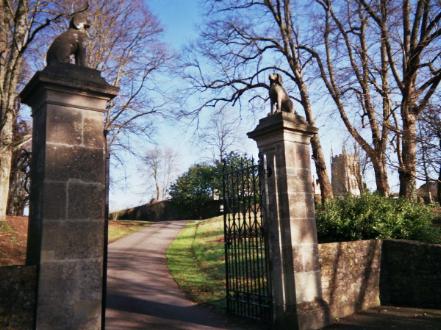
A good number of we happy St Andreans were down in the West Country recently — Somerset to be precise — for the wedding of two of our dear and closest friends [to be covered in a later post]. Being in Somerset, Alec, “Ishmael”, Clare and my good self decided to hop over to the little village of Mells last Friday to see the grave of Msgr. Ronald Knox and to sup at what is known as one of the best pubs in all of England. (more…)
Sir John Cowperthwaite
St Andrean Responsible for Hong Kong’s ‘Economic Miracle’
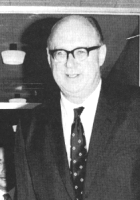 Sir John Cowperthwaite was the main figure responsible for Hong Kong’s economic transformation, lifting millions of people out of poverty. While scholars like Milton Friedman and F. A. Hayek put an intellectual case for the free markets, it was Cowperthwaite who provided the textbook example showing economically liberal policies leading to swift economic development. His practical example provided confidence to the Thatcher and Reagan governments, and was a key influence in China’s post-Mao economic liberalisation.
Sir John Cowperthwaite was the main figure responsible for Hong Kong’s economic transformation, lifting millions of people out of poverty. While scholars like Milton Friedman and F. A. Hayek put an intellectual case for the free markets, it was Cowperthwaite who provided the textbook example showing economically liberal policies leading to swift economic development. His practical example provided confidence to the Thatcher and Reagan governments, and was a key influence in China’s post-Mao economic liberalisation.
Cowperthwaite read classics at St Andrews and Christ’s College, Cambridge. While waiting to be called up by the Cameronians (Scottish Rifles), he went back to St Andrews to study economics. This Scottish education imbibed him with the ideas of the Enlightenment, especially the work of Adam Smith, who had been born nearby in Kirkcaldy. He was a liberal in the 19th century sense, believing that countries should open up to trade unilaterally. In 1941, he joined the Colonial Administrative Service in Hong Kong. When it fell to the Japanese, he was seconded to Sierra Leone as a district officer, before returning in 1946 to help the colony’s economic recovery. “Upon arrival,” the Far Eastern Economic Review put it, “he found it recovering quite nicely without him.” He quickly worked his way up the ranks and was made Financial Secretary in 1961, in charge of its economic policy for a decade.
When he became Financial Secretary, the average Hong Kong resident earned about a quarter of someone living in Britain. By the early 90s, average incomes were higher than Britain’s. Cowperthwaite made Hong Kong the most economically free economy in the world and pursued free trade, refusing to make its citizens buy expensive locally-produced goods if they could import cheaper products from elsewhere. Income tax was never more than a flat rate of fifteen percent. The colony’s lack of natural resources, apart from a harbour, and the fact that it was a food importer, made its success all the more interesting. Cowperthwaite’s policies soon soon attracted the attention of economists like Milton Friedman, whose television series Free to Choose featured Hong Kong’s economic progress in some detail.
Asked what is the key thing poor countries should do, Cowperthwaite once remarked: “They should abolish the Office of National Statistics”. In Hong Kong, he refused to collect all but the most superficial statistics, believing that statistics were dangerous: they would led the state to to fiddle about remedying perceived ills, simultaneously hindering the ability of the market economy to work. This caused consternation in Whitehall: a delegation of civil servants were sent to Hong Kong to find out why employment statistics were not being collected; Cowperthwaite literally sent them home on the next plane back.
Cowperthwaite’s frugality with taxpayers’ money extended to himself. He was offered funds from the Hong Kong Executive to do a much needed upgrade to his official residence, but refused pointing out that since others in Hong Kong did not receive that sort of benefit, he did not see why he should.
Cowperthwaite’s hands off approach, and rejection of the in vogue economic theory, meant he was in daily battle against Whitehall and Westminster. The British government insisted on higher income tax in Singapore; when they told Hong Kong to do the same, Cowperthwaite refused. He was an opponent of giving special benefits to business: when a group of businessmen asked him to provide funds for tunnel across Hong Kong harbour, he argued that if it made economic sense, the private sector would come in and pay for it. It was built privately. His economic instincts were revealed in his first speech as Financial Secretary: “In the long run, the aggregate of decisions of individual businessmen, exercising individual judgment in a free economy, even if often mistaken, is less likely to do harm than the centralised decisions of a government, and certainly the harm is likely to be counteracted faster.”
His ability to pursue policies which, at the time, were deeply unfashionable, was helped by having supportive Hong Kong Governors, Sir Robert Black and Sir David Trench, who both had free market sympathies. Moreover, Cowperthwaite was formidable at arguing his case: as Dennis Healey recalled: “I always retired hurt from my encounters with the redoubtable Financial Secretary.”
From 1972 to 1981, Cowperthwaite was an advisor to Jardine Flemming & Co in Hong Kong. He retired to St Andrews with his wife Sheila and was an active member of the Royal & Ancient. For many years, he spent six months of the year with his wife traveling the world visiting friends and relatives. He was an old school civil servant and, much to the frustration of economists, resisted requests to write an autobiography about his time in Hong Kong, believing that his duty was to serve, not to reveal the minutiae of government business.
– John James Cowperthwaite KBE OBE CMG, Financial Secretary of Hong Kong, born 25 April 1915; died 21 January 2006.
Peter Simple is Dead
Michael Wharton, the genius behind the Peter Simple column in the Daily Telegraph, died on Sunday at 92 years of age. Wharton was “a quietly spoken, cherubic-featured man who ate corned beef sandwiches and drank brandy and ginger ale in a Fleet Street pub every lunchtime” according to his obituary in the Telegraph which provides some background to the man who invented an imaginary realm with which to point out the faults and foibles of the real one. Here we provide some excerpts which we found particularly interesting, amusing, or explanatory.
Wharton’s first volume of autobiography, The Missing Will (1984), opened with an evocation of childhood memories: the great house, with its Long Gallery and the smooth green lawns, on the day news arrived from the Western Front that his elder brother, the Viscount, was dead. It went on to recount, however, that he was really born Michael Bernard Nathan, the son of an unsuccessful businessman of German-Jewish origins, on April 19 1913 at Shipley, in the West Riding of Yorkshire.
Young Michael was educated at Bradford Grammar School and Lincoln College, Oxford, where he learned to drink and to be idle. He took on the persona of a Tory anarchist who supported Franco and was determined to be of the Right, even if not a paid-up member. Eventually he was rusticated for throwing an egg at High Table and dismantling a sofa which was then pushed out of a window.
On the outbreak of the Second World War he joined the Royal Artillery, under his mother’s maiden name of Wharton. After obtaining a commission, he was sent to India, where he became an intelligence officer, eventually being attached to the General Staff and rising to the rank of acting lieutenant-colonel. Since the threat to India from both Germany and Japan was largely theoretical towards the end of the war, Wharton’s restless imagination came into play. He invented the Thargs, a sect of redheaded tribesmen in the Sind Desert, descendants of Alexander the Great’s soldiery who were in wireless contact with Hitler’s High Command. While studying the few facts available on some dull Japanese generals, he conjured up a one-eyed officer of the Imperial high command who had developed a fierce hatred of England after living in Harrogate where he had learnt the secret of toffee-making.
An advertisement “Learn Etruscan the Way They Did” produced a host of orders which eventually led to an announcement that the Etruscan records were sold out but that there were still stocks of Old Prussian, Aztec and Pictish; several requests inevitably followed.
The Daily Telegraph even devoted a lead editorial to Wharton’s passing, entitled ‘Death of a Genius’. God rest the soul of this brilliant and hilarious man, who provided thought and amusement for so many throughout his years.
The New PMC
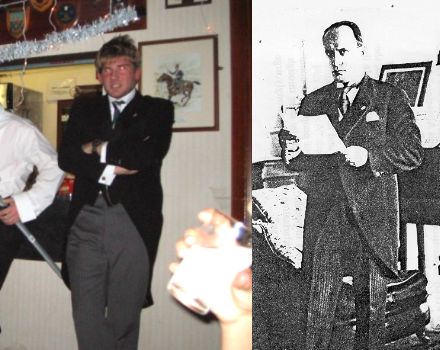
At left: The newly-elected PMC, A Sqn TUOTC, Scotland, 2005. At right: The newly-elected Prime Minister, Italy, 1922. An intriguing juxtaposition.
Though I am still Stateside, I should like extend our slightly belated congratulations to J.E.B., Esq., whom Tom Marshall has described as “the greatest potential cavalryman since Harry Flashman”, on his election to the Presidency of the Mess Committee this past December. Mr. J.E.B. is something of a legend in the Auld Grey Toon and the Mess will benefit from his profound wisdom, not to mention his lack of affection for bad music. A pipe smoker, J.E.B. is the donor of the Mess’s engraved pipe rack which rests on the mantel below the portrait of Her Majesty.
(Photos courtesy of Miss K. Dilworth)
The Last Post of 2005
A Drink at the Gills’
The other day the Gills invited me over to dinner as the patriarch of the family, one of the most amusing men in lower Westchester (if not all of Westchester) was preparing his speciality of Shepherd’s Pie. The timing was unfortunate, however, since it was the nativital feast of my own pater familias and thus attendance was required at our own dynastic mastication of the evening meal. Nonetheless I agreed to head over Gill-ward a bit before dinner and enjoy a little drink. Caroline and Michelle, true to form, were late for dinner and thus I actually didn’t manage to see either of them before heading to Pop’s birthday feast but I did rather enjoy a nice civilised glass of red with Mater et Pater Gill and a family friend of their’s from Larchmont.
Lord and Lady Gill recently had the pleasure of hearing their younger daughter Lizzy sing in Carnegie Hall, though with the marked reservation that they considered it an ‘alternative’ concert, by which they mean to say it broke their usual statutory “Fifty-Year Rule” whereby they do not attend choral events unless the composer has been dead for at least half a century. To break this sacred doctrine, say the Gills, is to run the strong risk of becoming the latest victim of atonality and disharmony. (As an aside, any fans of atonality, ye poor wretched souls, would be interested to know that the Met is doing Berg’s Wozzeck this season). Nonetheless, Mr. and Mrs. Gill donned their noblesse oblige and attended. Besides, the two pieces Lizzy’s group were singing were Byrd and Tallis, if my memory serves me, so the offending parties were other participants in the concert, praise be.
Anyhow, the family friend from Larchmont asked me how I came to be friends with Caroline which provided me the splendid opportunity of telling the story of the first meeting of yours truly and dear old Caro.
A Young Lady Stuck in a Tree, or: That Wicked Day When We First Chanced to Meet Caroline
Well it was a fall day, perhaps winter, but at any rate it was during the school year. My alma mater was always in the habit of spoiling me by giving me a double-period for lunch which afforded me the time to travel back home for midday victuals, or to world-famous Walter’s in Mamaroneck, or to occasionally luncheon with comrades attending other establishments of secondary education. Well, as the occasion would have it I one day arranged to lunch with young Miss Emma Haberl, une lycéen of Bronxville High School. Emma asked if she might bring along her friend Caroline, and at the time a firm believer in the more the merrier I happily acquiesced to her proposal. The meeting place was agreed as the hour of one in the front courtyard of Bronxville High School.
Well, I duly arrived at the appointed time and place to discover a courtyard bare of any personages bar our Emma. “I thought you said your friend Caroline was coming?” I inquired. Emma was braced to reply when a shrill abrasive voice emanating from a nearby tree shouted “I’M STUCK IN THE TREE! I CAN’T GET DOWN” And, she told no lie, she was stuck in the tree, though I’m happy to report not for very long. We soon had her out and highed off to luncheon during which I managed to offend Caroline in all sorts of charming and hilarious ways.
Last Night’s Soirée Chez Brenner
The Brenners, a most intelligent and amusing family whose presence I always enjoy, threw a little holiday light-dinner-and-drinks sort of thing last night at their place over in Larchmont. Eldest son Adam and I are friends because we had a good friend in common back in our school days (none other than the famous Lucas de Soto). Adam, you see, was not blessed enough to be a Thorntonian; he had to suffer through all those years at Riverdale instead. Anyhow, Brenner decided to sample the university life over at St Andrews by doing a junior semester abroad during Candlemas Term of ’04. Twas the dinner for Adam’s twenty-first at the Caledonian in Edinburgh after which Whit ‘Lawrenceville Spirit Personified’ Miller and I missed the last train back to our little corner of Fife and had to wait ages in Waverley Station for a taxi from St Andrews to arrive. A gaggle of neds (or chavs or what-have-you) crawled out of their hovel and investigated the curiously well-dressed pair of Americans conversing by the taxi rank. Eventually we fended them off.
But digression has got the better of me. As I was saying, the Brenners threw a nice event last night, the Eve of New Year’s Eve, and there was some good conversation. Brenner’s roommate during his term at St Andrews, now a Presby seminarian at Princeton Theological, was also in attendance and it was good to catch up and see what’s what and all that. Another friend of the Brenners’, a lady sophomore in college, explained her hopes to spend a year in Argentina and so the few of us who have been took the liberty of pontificating about what to do and where to go and generally showing off our savoir-faire, etc., etc.
I took great pleasure in commiserating with elders around the buffet about how much we hate New Year’s and what a bother it is and how preferable it is just to stay at home. Personally, I think New Year’s is a bit of a farce. Any evening is one year past the same evening the year before, so why the need to make a big to-do of it? I’ve no idea. I’ve never been a fan of New Year’s Eve myself. Such a silly evening.
After the Party… to Fogarty’s
After the party had run its course I went down to Fogarty’s in town to have a pint with a few friends, though I soon abandoned them for Mr. and Mrs. Carroll (Michelle’s parents) who were infinitely better chat than the haggardly sextet with which I was supposed to be conversing. I had the privilege of hearing why the Carrolls decided to move to America (they originally hail from the Emerald Isle) and other fascinating and amusing tales. When the topic of my future, inevitable at this juncture of life, surfaced Mr. Carroll declared his belief that I’ve got the makings of a gentleman farmer in me. The older I get the more I grow fond of the idea of a rustic existence. Sure, once I’ve got a family to myself I’d much prefer to worry about my children falling into brooks and streams in the country rather than getting run over by some soccer mom in her Land Rover in suburbia. Anyhow, Mr. and Mrs. Carroll deserve prizes for the consistently high standard of banter they uphold. After all, high standards are hard to come by these days.
The Anti-Social Guide to New Year’s Eve
I have been rudimentarily clever in avoiding attendance at any social occasion this New Year’s Eve. By implying to the party on the West Side that I will be attending the soirée on E. 89th and implying to the party on E. 89th that I have already committed myself to attending the party on the West Side, all the while forgetting about the event on 14th Street I am comfortably lounging on the sofa at home in the Garden Room watching an episode of Rumpole of the Bailey which I’ve taken out from one of the neighboring villages’ public libraries. With the firm knowledge that my immediate social circle find this little corner of the web far too dull to for their browsing, adding to the fact that all will be pleasantly sloshed this merry eve, I am sure that none will come to knowledge of my little scheme.
Finale
All that remains then is to wish you all, dear readers, a most happy, holy, and enjoyable New Year and may the Lord continue to smile upon yourselves, your families, and all your loved ones!
Boy Mulcaster and James Panero: Separated at Birth?
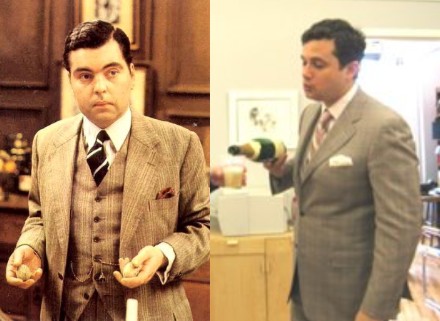
Am I the only one who sees the resemblance between the boisterous character from the television adaptation of Brideshead Revisted and the managing editor of the New Criterion?
Previously: Arafat Joins Team Zissou
Welcome to Doughty Street
It is an eternal and reassuring fact of human nature that when an editor announces that he is stepping down from a great publication, there is not the slightest interest in what he plans to do with his life, or even who he was.
I have received many phone calls from friends and colleagues since announcing last Friday that this would be my last edition, and they only want to know one thing. ‘Who is taking over?’
I wish I knew myself. But since the white smoke has yet to go up, I thought I had better write a general welcome to whoever you are out there. I propose to open the door of 56 Doughty Street and show you — not so much how it’s done — but where it’s done.
You arrive at a big black door in Holborn with a brass plaque, and after you have gained admission, you find a scene of domestic chaos, with dog leads, umbrellas, champagne and other impedimenta. Immediately beneath a sign saying ‘No Bicycles’ you will notice several bicycles.
You will dimly glimpse other offices ahead and to your left, the Books and Arts and Cartoon departments, bulging with the greatest talents in journalism. But if you are like me, you will be overcome with nerves and scoot straight upstairs for your office, on the first floor. As soon as you walk in, your heart will lift.
It is a magnificent room, a huge Victorian drawing-room with a chandelier and three sash windows looking out on the street where Charles Dickens lived, with an assortment of furniture both distinguished and distressed.
As you walk to your desk you cross Ian Gilmour’s (editor 1954–59) carpet, a large, fine and extremely valuable Turkish rug. Occasionally in the last 50 years there have been peeps from Isleworth suggesting this carpet might be returned. You will find these suggestions increasingly easy to ignore.
You sit down at the colossal desk. You find a Black Museum of Spectator history. There is a fragment of red telephone box, rescued by Charles Moore (editor 1984–1990). There is a big yellow molar in a plastic thimble, apparently wrenched from the merry chaps of Frank Johnson (editor 1995–1999). There is a silver-plated statuette of a miner with pick and shovel, presented to ‘The Spectator’ by the townsfolk of Aberdare in 1929. ‘In grateful recognition,’ says the plaque, adding, ‘the greatest of these is love.’
Hear, hear, you say, and try the drawers. You will find the handles mainly broken, but in the bottom left is a fabulous cache of letters congratulating Dominic Lawson (editor 1990–1995) on acceding to your chair. You will by now be blizzarded with your own letters of congratulation, and in some cases you will have received the same letters, from the same people, offering the same columns!
Before you have time to recover, your hugely efficient PA will be patching you through to Downing Street, because the Prime Minister wants to congratulate you in person. You leave instantly, and have half an hour in the sofa room with Tony, during which he will extol the magazine and (quite properly) the genius of Paul Johnson.
If you do the job in the way that we all hope, that will be the last friendly contact you have with the regime. In due course, when Downing Street takes you to the Press Complaints Commission over a story that turns out to be 100 per cent right, you will have to keep your nerve. Old chums will turn up in your office, urging you to capitulate. Don’t.
The Spectator surrenders to no one. The Spectator is always right.
When you return from your audience you may be tired and cold, and I recommend that you light the gas fire. There are few sights more cheering than that fire on a winter’s day, though you should not forget to turn it off when you leave. I did, and the Nigerian security guy put it out with the fire extinguisher.
Once the fire is going well, you may find your eyes drifting to the lovely striped chesterfield across the room. Is it the right size, you wonder, for a snooze…? You come round in a panic, to find a lustrous pair of black eyes staring down at you.
Relax. It’s only Kimberly, with some helpful suggestions for boosting circulation. Just pat her on the bottom and send her on her way. Whatever you do, don’t get depressed if she starts saying ‘noos-stand is sawft this week, Booriss’ (she is American) or that she doesn’t like your cover. That’s her job, and if you put your back into yours you’ll find that news-stand has a way of gently recovering.
Just as you’re drifting off again, the phone goes. There are two phones on the desk, white and black. If it is the white phone, on your first day in the job, I would say it is a dime to a dollar that the caller is Bruce Anderson.
Now Bruce is a wonderful fellow and an excellent writer, but if you happen to tell him, after lunch, that you do not have space for a piece, he is apt to get morbid. ‘I will destroy you,’ he starts saying. ‘I will destroy you and your reputation for ever.’ Do not on any account take fright. He doesn’t mean it. The best thing is to blow kisses down the phone and commission a piece for the following week.
And then the phone goes again, and this time I would wager it is Taki, calling from Gstaad, full of good cheer and anxious to find out whether or not you are going to sack him. At this stage in your editorship the sacking or keeping of Taki is likely to be turned into a culture war of Dreyfus-like proportions.
The Guardian and other papers will start a horrible drumming roar for his dismissal. It is time, they say, that The Spectator showed it has moved on. Soon the whole of civilised London has joined in. Sack Taki! Sack Taki!
Faced with that overwhelming consensus, you have only one choice, though it is of course entirely up to you to decide what that is.
By now the day is drawing to an end, and it is time to see how everyone else is getting on. You stick your head round the next-door office, about a third of the size of yours, and occupied by three people and….Is that a dog? It is Harry, a highly intelligent and handsome Jack Russell, and certainly no smellier than anyone else in the building.
You go upstairs, past girlish giggles and shrieks emanating from the publisher’s office, and you pass other tiny offices, full of editors and computers and industry of all kinds, until you reach the dining-room.
Here you will pass many happy hours, some of them conscious. These are the very windows through which the magazine’s famous cook, Jennifer Paterson, threw the crockery into the garden of the National Association of Funeral Directors next door. This is the table where most of the copy-editing is done on Mondays and Tuesdays, expert hands and eyes buffing and polishing the contributions with the care of Amsterdam jewellers.
And then, last but not least, you go downstairs to pay homage to the advertising and production teams, who keep The Spectator awash with ads for handbags and help to pay your mortgage. Over time you will find that it pays to listen carefully to what they say, and oblige them as far as you can.
So ends the tour of the ancient distillery. The big black door slams behind you for the first time, as it slammed behind me for the last time this week. Thanks to the exertions of the brilliant team you inherit, the magazine is in the pink of financial health with circulation at an all-time high.
You will be urged to drag it ‘kicking and screaming into the 21st century’. But as editor of The Spectator you should not be tied to any particular decade, century, or even millennium.
You are a Time Lord, and your readers expect you to take them to all parts of the human experience, and to remember that the Bible and Homer are far more interesting and important, sub specie aeternitatis, than the price of oil or Tory prospects.
You will be told that the magazine is elitist, and you should take that as a compliment. Every society that we know of has been run by an elite, and every elite needs elucidation.
Every industry or profession needs an angel at the top of their Christmas tree, and in the case of journalism you hold that angel in your hands.
You will receive threatening letters from female journalists, urging you to have more female bylines, starting with their own, and I would not dream of advising you there.
You will find that our proprietors are little short of superb. They are cheerful, tolerant, wise, and eager to develop and improve the magazine.
I have a feeling that they are bluff enough not to mind the occasional laugh at their own expense, but I confess I have not had the nerve to find out.
Like everyone in a new post, you will probably have a tough first six months. You will then discover that you have, by some margin, the best job in London, and I have no doubt that you will have fun to a degree that is almost improper.
Search
Instagram: @andcusack
Click here for my Instagram photos.Most Recent Posts
- Teutonic Takeover March 10, 2025
- Katalin Bánffy-Jelen, R.I.P. March 3, 2025
- Substack Cusackiensis March 3, 2025
- In the Courts of the Lord February 13, 2025
- American Exuberant February 10, 2025
Most Recent Comments
Book Wishlist
Monthly Archives
Categories


